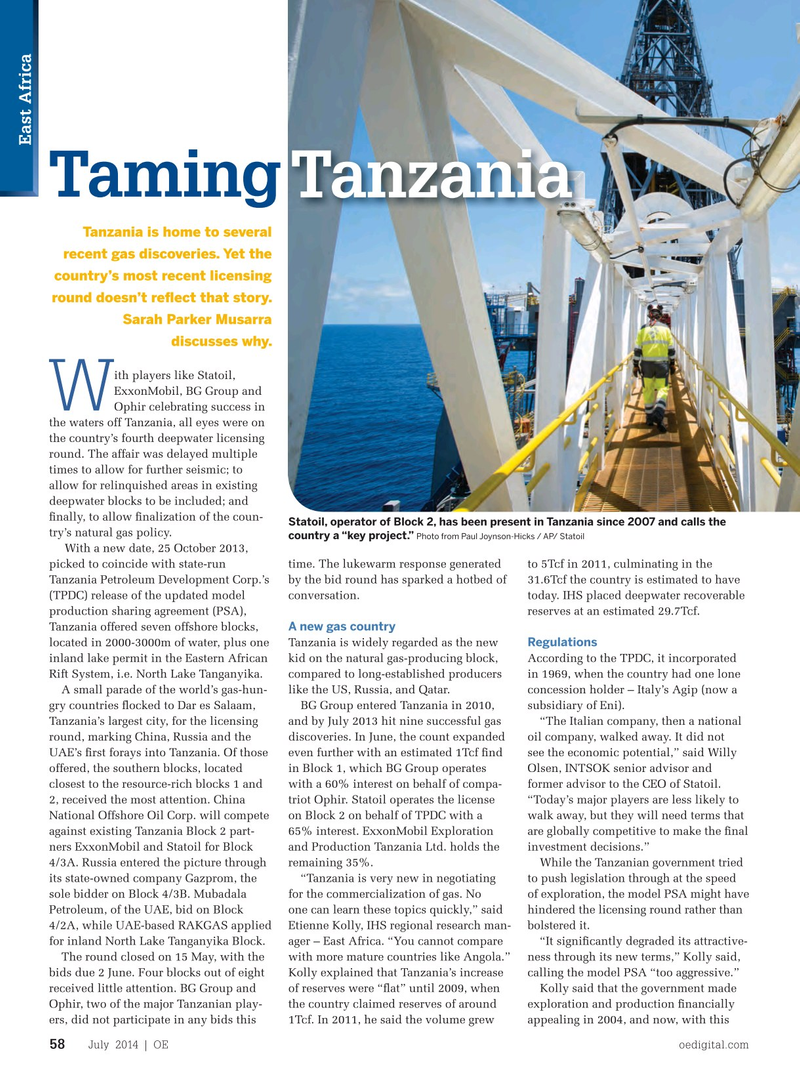
Page 56: of Offshore Engineer Magazine (Jul/Aug 2014)
Read this page in Pdf, Flash or Html5 edition of Jul/Aug 2014 Offshore Engineer Magazine
East Africa
Taming
Tanzania
Tanzania is home to several recent gas discoveries. Yet the country’s most recent licensing round doesn’t re? ect that story.
Sarah Parker Musarra discusses why. ith players like Statoil,
ExxonMobil, BG Group and
W
Ophir celebrating success in the waters off Tanzania, all eyes were on the country’s fourth deepwater licensing round. The affair was delayed multiple times to allow for further seismic; to allow for relinquished areas in existing deepwater blocks to be included; and ? nally, to allow ? nalization of the coun-
Statoil, operator of Block 2, has been present in Tanzania since 2007 and calls the try’s natural gas policy. model PSA 2013, ? scally country a “key project.” Photo from Paul Joynson-Hicks / AP/ Statoil With a new date, 25 October 2013, tightened up the terms in an to 5Tcf in 2011, culminating in the time. The lukewarm response generated picked to coincide with state-run attempt to capitalize on per- 31.6Tcf the country is estimated to have by the bid round has sparked a hotbed of Tanzania Petroleum Development Corp.’s ceived boom money. Harriet today. IHS placed deepwater recoverable conversation. (TPDC) release of the updated model Okwi, IHS senior analyst reserves at an estimated 29.7Tcf. production sharing agreement (PSA), and consultant – Africa oil
A new gas country
Tanzania offered seven offshore blocks, and gas points to a lack of
Regulations
Tanzania is widely regarded as the new located in 2000-3000m of water, plus one exploration history, limited
According to the TPDC, it incorporated kid on the natural gas-producing block, inland lake permit in the Eastern African available data for Blocks in 1969, when the country had one lone compared to long-established producers Rift System, i.e. North Lake Tanganyika. 5A and 5B, and the fact that concession holder – Italy’s Agip (now a like the US, Russia, and Qatar. A small parade of the world’s gas-hun- Blocks 4A and 4B were areas subsidiary of Eni). BG Group entered Tanzania in 2010, gry countries ? ocked to Dar es Salaam, relinquished by BG and “The Italian company, then a national and by July 2013 hit nine successful gas Tanzania’s largest city, for the licensing Ophir as contributing factors oil company, walked away. It did not discoveries. In June, the count expanded round, marking China, Russia and the to this “muted” response. see the economic potential,” said Willy even further with an estimated 1Tcf ? nd UAE’s ? rst forays into Tanzania. Of those “I believe the terms that came with the
Olsen, INTSOK senior advisor and in Block 1, which BG Group operates offered, the southern blocks, located licensing round largely contributed to former advisor to the CEO of Statoil. with a 60% interest on behalf of compa- closest to the resource-rich blocks 1 and the limited investor interest. The 2013 “Today’s major players are less likely to triot Ophir. Statoil operates the license 2, received the most attention. China MPSA reduced the contractor share of walk away, but they will need terms that on Block 2 on behalf of TPDC with a National Offshore Oil Corp. will compete pro? t, raised the royalty rate and lowered are globally competitive to make the ? nal 65% interest. ExxonMobil Exploration against existing Tanzania Block 2 part- the cost recovery ceiling. The MPSA investment decisions.” and Production Tanzania Ltd. holds the ners ExxonMobil and Statoil for Block also introduced signature and production
While the Tanzanian government tried remaining 35%. 4/3A. Russia entered the picture through bonuses, stricter exploration, and local to push legislation through at the speed “Tanzania is very new in negotiating its state-owned company Gazprom, the content requirements and capital gains of exploration, the model PSA might have for the commercialization of gas. No sole bidder on Block 4/3B. Mubadala taxes on transactions.” hindered the licensing round rather than one can learn these topics quickly,” said Petroleum, of the UAE, bid on Block Offshore royalty rates were raised 2% bolstered it. Etienne Kolly, IHS regional research man- 4/2A, while UAE-based RAKGAS applied from the 2008 model PSA to 7.5%. There “It signi? cantly degraded its attractive- ager – East Africa. “You cannot compare for inland North Lake Tanganyika Block. is a minimum signature bonus payment ness through its new terms,” Kolly said, with more mature countries like Angola.” The round closed on 15 May, with the of US$2.5 million and a production calling the model PSA “too aggressive.” Kolly explained that Tanzania’s increase bids due 2 June. Four blocks out of eight bonus of at least $5 million, payable
Kolly said that the government made of reserves were “? at” until 2009, when received little attention. BG Group and when production commences. In regards exploration and production ? nancially the country claimed reserves of around Ophir, two of the major Tanzanian play- to taxation, any assignment or transfer appealing in 2004, and now, with this 1Tcf. In 2011, he said the volume grew ers, did not participate in any bids this under the PSA is subject to the relevant
July 2014 | OE oedigital.com 58 058_OE0714_Tanzania.indd 58 6/20/14 12:54 PM

 55
55

 57
57